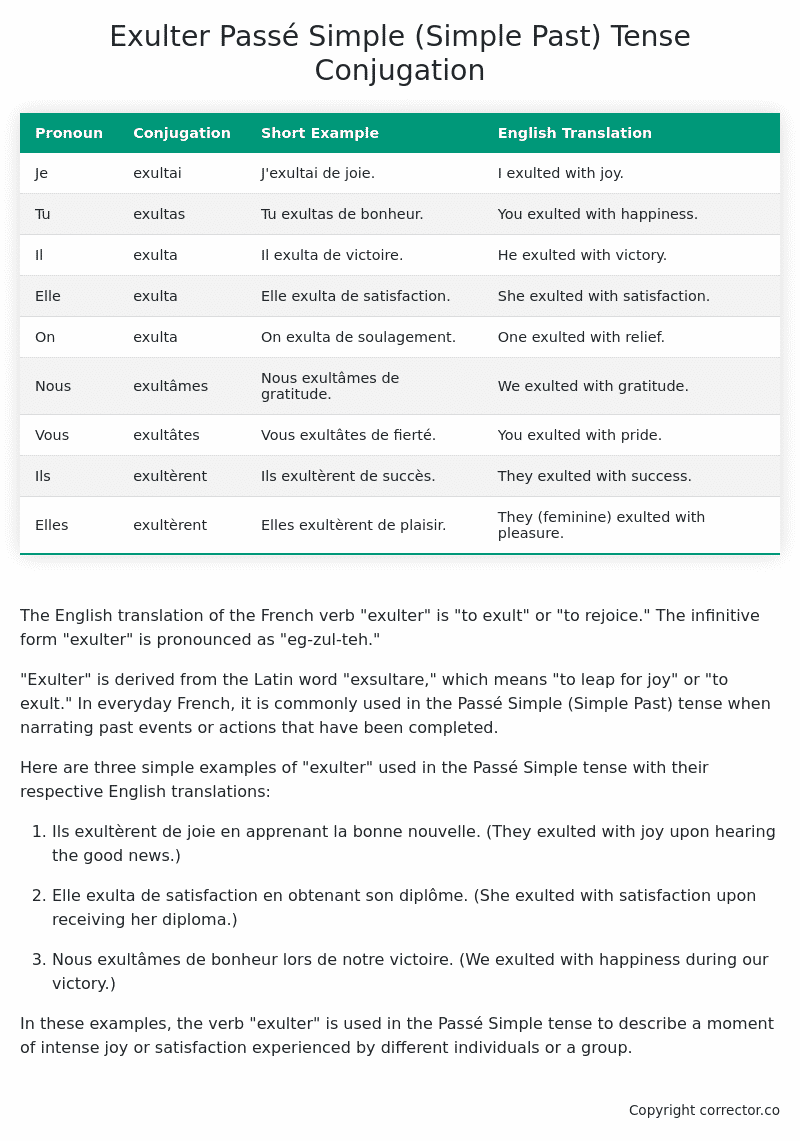Passé Simple (Simple Past) Tense Conjugation of the French Verb exulter
Introduction to the verb exulter
The English translation of the French verb “exulter” is “to exult” or “to rejoice.” The infinitive form “exulter” is pronounced as “eg-zul-teh.”
“Exulter” is derived from the Latin word “exsultare,” which means “to leap for joy” or “to exult.” In everyday French, it is commonly used in the Passé Simple (Simple Past) tense when narrating past events or actions that have been completed.
Here are three simple examples of “exulter” used in the Passé Simple tense with their respective English translations:
-
Ils exultèrent de joie en apprenant la bonne nouvelle.
(They exulted with joy upon hearing the good news.) -
Elle exulta de satisfaction en obtenant son diplôme.
(She exulted with satisfaction upon receiving her diploma.) -
Nous exultâmes de bonheur lors de notre victoire.
(We exulted with happiness during our victory.)
In these examples, the verb “exulter” is used in the Passé Simple tense to describe a moment of intense joy or satisfaction experienced by different individuals or a group.
Table of the Passé Simple (Simple Past) Tense Conjugation of exulter
| Pronoun | Conjugation | Short Example | English Translation |
|---|---|---|---|
| Je | exultai | J’exultai de joie. | I exulted with joy. |
| Tu | exultas | Tu exultas de bonheur. | You exulted with happiness. |
| Il | exulta | Il exulta de victoire. | He exulted with victory. |
| Elle | exulta | Elle exulta de satisfaction. | She exulted with satisfaction. |
| On | exulta | On exulta de soulagement. | One exulted with relief. |
| Nous | exultâmes | Nous exultâmes de gratitude. | We exulted with gratitude. |
| Vous | exultâtes | Vous exultâtes de fierté. | You exulted with pride. |
| Ils | exultèrent | Ils exultèrent de succès. | They exulted with success. |
| Elles | exultèrent | Elles exultèrent de plaisir. | They (feminine) exulted with pleasure. |
Other Conjugations for Exulter.
Le Present (Present Tense) Conjugation of the French Verb exulter
Imparfait (Imperfect) Tense Conjugation of the French Verb exulter
Passé Simple (Simple Past) Tense Conjugation of the French Verb exulter (You’re reading it right now!)
Passé Composé (Present Perfect) Tense Conjugation of the French Verb exulter
Futur Simple (Simple Future) Tense Conjugation of the French Verb exulter
Futur Proche (Near Future) Tense Conjugation of the French Verb exulter
Plus-que-parfait (Pluperfect) Tense Conjugation of the French Verb exulter
Passé Antérieur (Past Anterior) Tense Conjugation of the French Verb exulter
Futur Antérieur (Future Anterior) Tense Conjugation of the French Verb exulter
Subjonctif Présent (Subjunctive Present) Tense Conjugation of the French Verb exulter
Subjonctif Passé (Subjunctive Past) Tense Conjugation of the French Verb exulter
Subjonctif Imparfait (Subjunctive Imperfect) Tense Conjugation of the French Verb exulter
Subjonctif Plus-que-parfait (Subjunctive Pluperfect) Tense Conjugation of the French Verb exulter
Conditionnel Présent (Conditional Present) Tense Conjugation of the French Verb exulter
Conditionnel Passé (Conditional Past) Tense Conjugation of the French Verb exulter
Conditionnel Passé II (Conditional Past II) Tense Conjugation of the French Verb exulter
L’impératif Présent (Imperative Present) Tense Conjugation of the French Verb exulter
L’impératif Passé (Imperative Past) Tense Conjugation of the French Verb exulter
L’infinitif Présent (Infinitive Present) Tense Conjugation of the French Verb exulter
L’infinitif Passé (Infinitive Past) Tense Conjugation of the French Verb exulter
Le Participe Présent (Present Participle) Tense Conjugation of the French Verb exulter
Le Participe Passé (Past Participle) Tense Conjugation of the French Verb exulter
Struggling with French verbs or the language in general? Why not use our free French Grammar Checker – no registration required!
Get a FREE Download Study Sheet of this Conjugation 🔥
Simply right click the image below, click “save image” and get your free reference for the exulter Passé Simple tense conjugation!

Exulter – About the French Passé Simple (Simple Past) Tense
Formation
Usage
Narration
Historical Context
Interactions with other tenses
Passé Composé
Imparfait
Conditional and Subjunctive
Summary
I hope you enjoyed this article on the verb exulter. Still in a learning mood? Check out another TOTALLY random French verb conjugation!


